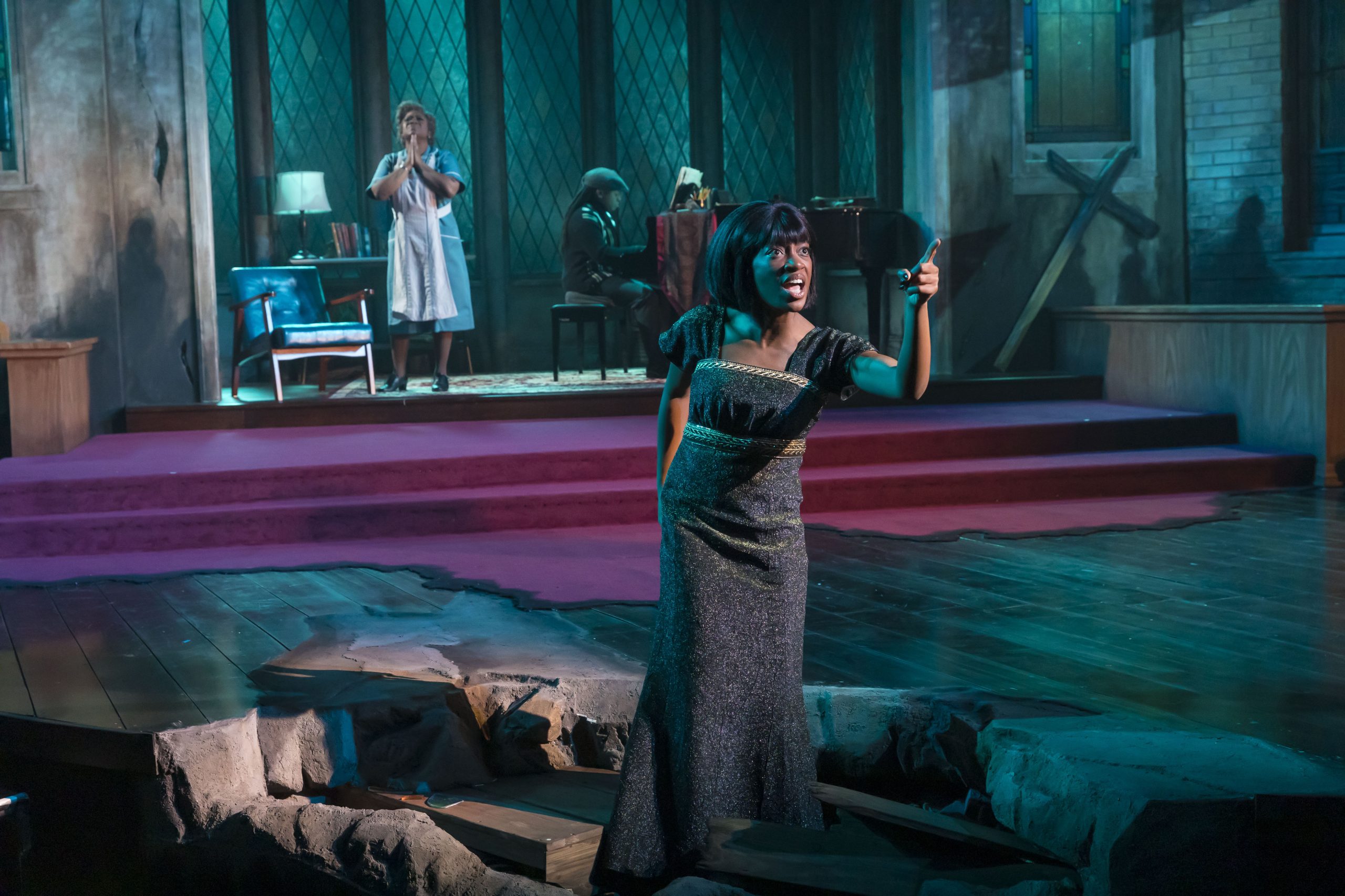
Nina Simone: Four Women – Courtesy of Zach Rosing. Used with permission.

Nina Simone: Four Women – Courtesy of Zavh Rosing. Used with permission.
While witnessing “Nina Simone: Four Women at Friday’s opening night performance on The OneAmerica Stage at the Indiana Repertory Theatre, I was reminded that as much as we have moved forward with Civil Rights in this country, as far as ending racism, in many ways, the irrational fear of racial difference is, alarmingly, still with us. As a person of color myself, the issue hits painfully close to home, especially in view of current events which include the dissolution of government DEI (Diversity, Equity & Inclusion) programs, by the current U.S administration.
Not billed as a Black History Month feature, nevertheless, the play, with music, by Christina Ham, shines a spotlight on singer, pianist, songwriter, composer, arranger and iconic civil rights activist Nina Simon, through her bold music. Though classically trained, her body of work encompassed multi musical genres such as R & B, blues, gospel, pops, jazz and classical. The play’s title refers to Simone’s famous song, “Four Women,” which, like many songs in her repertoire, expressed the jazz singer’s deep sorrow, frustration and rage during the turbulent era of resistance against tyranny and violence in during the oppressive post Jim Crow era South.
The other three characters in the play, which envisions a conversation between Simone and three other archetypical black women. Set in September 1963 in Birmingham, Alabama, after four young black girls have just horrifically been murdered in the 16th Street Baptist Church bombing, Nina Simone (Akii Ni Mai)), a rising musician, has visited the church ruins, seeking to find the inspiration to write a protest song to inspire critical change. She is joined in the church by Sarah (Jamecia Bennett), a religiously minded maid, Sephronia (Ariel William)), a mixed race “high yellow” black activist and Sweet Thing (Precious Omigi)), a spunky prostitute. The four women all lead disparately different lives, but their chance encounter in this intolerable moment creates an unexpected bond between them.

Nina Simone: Four Women – Courtesy of Zach Rosing. Used with permission.
Songs from Simone’s cannon in the play, artfully directed by Austine Van, who also provided movement, include “Sea Lion Woman,” “God Be With ‘til We Meet Again.” “Images,” “Everything Must Change,” “To Be Young, Gifted and Black,” and “Four Women.”
Overall, the entire ensemble operated as a well-oiled machine with each artist turning in compelling, convincing performances that were sparked by passion, energy and commitment. Standing out individually was Bennet whose potent rendition of “The Eye is On The Sparrow” was a tour de force performance and crowd favorite. And effectively performing a major role in the production was Music Director and pianist Teneh B. C. Karmu.
Truly striking was Scenic Designer Regina Gacia’s depiction of the destroyed church along with the affecting lighting design of Nic Vincent. Other contributors to the design team were Costume Designer Matthew LeFebvre and Sound Designer Jeff Bailey.
For tickets to “Nina Simone: Four Women,” which runs through March 2 at Indiana Repertory Theatre, visit irtlive.com

Nina Simone: Four Women – Courtesy of Zavh Rosing. Used with permission.






One Comment
This play was provocative and powerful. It moved me to tears. The robust musical talent pulled watchers into the important message. I attend IRT with a diverse group and the play prompted lively discourse and varied interpretations. Each of us was deeply affected. I am so very happy to see IRT consistently push the predominately white, silver headed Thursday matinee audience into the truths of our history and times. Arts, politics, and our challenging times at it’s very best.